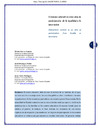Please use this identifier to cite or link to this item:
https://accedacris.ulpgc.es/jspui/handle/10553/106929
| Title: | Contextos educativos como área de participación: de la legalidad a la innovación | Other Titles: | Educational contexts as an area of participation: from legality to innovation | Authors: | Guerra Santana, Mónica Francisca Rodríguez Pulido, Josefa Artiles Rodríguez, Josué |
UNESCO Clasification: | 630903 Familia, parentesco 580202 Organización y dirección de las instituciones educativas 630705 Servicios sociales |
Keywords: | Familia Instituciones educativas Participación familiar Educador social Innovación, et al |
Issue Date: | 2021 | Journal: | Revista De Educacion Y Derecho - Educational And Law Review | Abstract: | El centro educativo debe de estar al servicio de las familias, de ahí que, en contextos de desventaja social, las escuelas públicas deben coordinarse con otras organizaciones de la comunidad para ofertar sus espacios para el bien común. En la actualidad en España contamos con un marco institucional que apoya y reafirma la participación de las familias en los centros educativos de manera formal, pero en cambio, al parecer, la realidad es bien distinta. La existencia de una escasa implicación de los padres y las madres en los órganos de participación en los centros educativos es evidenciada por numerosos estudios realizados. El presente trabajo tiene como objetivo abordar la importancia de la participación familiar en la institución educativa y cómo la coordinación y el apoyo entre ambos permitirá el pleno desarrollo social, psicológico y educativo del alumnado. Para lo cual la ley educativa establece sus protocolos pertinentes, de ahí que pretendemos presentar un estudio de caso concreto basado en las experiencias de participación familia-escuela donde, además, la figura del educador social juega un rol de gran importancia al incorporar a estos profesionales en la escuela. Con esta medida, pretenden conseguir el pleno desarrollo personal de cada estudiante, destacando principalmente la formación en valores, la resolución de conflictos, el control del absentismo escolar, la prevención del acoso escolar o el desarrollo de una convivencia cívica y democrática. The educational center must be at the service of families, which is why, in contexts of social disadvantage, public schools must coordinate with other community organizations to offer their spaces for the common good. Currently in Spain we have an institutional framework that supports and reaffirms the participation of families in schools in a formal way, but instead, apparently, the reality is quite different. The existence of a low involvement of fathers and mothers in the participation bodies in educational centers is evidenced by numerous studies. The present work aims to address the importance of family participation in the educational institution and how the coordination and support between the two willm allow the full social, psychological and educational development of the students. For which the educational law establishes its relevant protocols, hence we intend to present a concrete case study based on the experiences of family-school participation where, in addition, the figure of the social educator plays a role of great importance when incorporating these professionals at school. With this measure, they aim tom achieve the full personal development of each student, mainly highlighting the formation in values, the resolution of conflicts, the control of truancy, the prevention of bullying or the development of a civic and democratic coexistence. |
URI: | https://accedacris.ulpgc.es/handle/10553/106929 | ISSN: | 2386-4885 | DOI: | 10.1344/REYD2021.23.33852 | Source: | Revista de Educación y Derecho [ISSN 2386-4885], n. 23 (Abril 2021) |
| Appears in Collections: | Artículos |
Items in accedaCRIS are protected by copyright, with all rights reserved, unless otherwise indicated.
